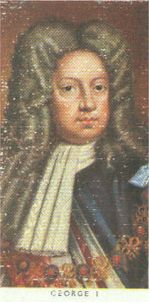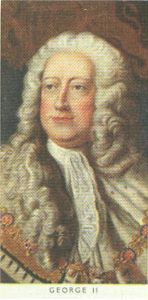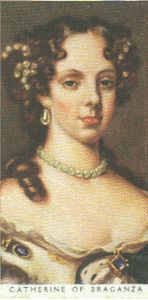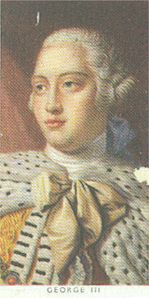Our Territories
Channel Islands
England
Ireland
Isle of Man
Scotland
Wales
Our Categories
Home | Set 1 | Set 2 | Set 3 | Set 4 | Set 5 | Set 6 | Set 7 | Set 8 | Set 9 | Set 10
 |
Anne Anne was the daughter of James II and Anne Hyde. Brought up as a Protestant, she had early to choose between loyalty to her father and loyalty to her faith. Deprived of domestic happiness, she found consolation in her friendships, especially that with Sarah, Duchess of Marlborough. Her strong Anglican and Troy views hardened into hostility to the rapidly-growing party system. Though active in affairs of state, she found her real enjoyment in hunting and racing. England under Anne was great, but the Queen herself was eclipsed by the brilliance of her epoch. |
 |
George I Great-grandson of James I (through his mother). George I succeeded Anne as Protestant heir of the Stuarts, having followed his father as ruler of Hanover in 1698. The failure of the Jacobite rising in 1715 gave him a better introduction to England than could otherwise have been hoped for, though he remained a stranger here, and never learned the language of his new subjects. His reign was occupied by the establishment of a new and more limited monarchy, Whig ascendancy and cabinet government. His wife, Sophia Dorothea of Celle, died in 1726. |
 |
George II Brought up in Hanover, George II was thirty-one when his father ascended the English throne. During the lifetime of his Queen he was wholly swayed by her in affairs of state, especially in her foreign policy of peace; but his own inclinations were for war and after Caroline's death he embarked on campaigns against the French, and won great victories in Europe, India and America. As with his father, Hanover was first in his mind and he remained a foreigner in England. Brilliantly served by Walpole and Pitt, he was ungrateful to them as he Ws Ungracious to everyone else. |
 |
Caroline of
Ansbach Having refused on religious grounds the hand of the future Emperor Charles VI; Caroline married in 1705 George, Prince of Hanover, afterwards Prince of Wales, and eventually King George II. A woman of wide intellectual tastes, she corresponded with the foremost thinkers of her day and was a patron of letters, though she never learned to speak or write English correctly. Through her personal charm and her complaisance she kept her husband's affection till her death, and through her own abilities won political control at Court. The great Walpole owed his power to her constant support. |
 |
George III Grandson of George II, he was the first English-born and English-speaking monarch since Anne. His views of kingship conflicted with the constitution, and for over twenty years he ruled largely by himself and through his friends, a policy which led to the American War and the loss of the colonies. Though finally submitting to his ministers, he remained an extreme Tory. Homely, domesticated and devout, he was popular with the middle-classes and in his mental powers, while they lasted; he was superior to his two predecessors. For the last ten years of his reign he was blind and mad. |
Home | Set 1 | Set 2 | Set 3 | Set 4 | Set 5 | Set 6 | Set 7 | Set 8 | Set 9 | Set 10